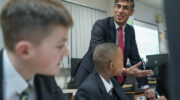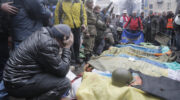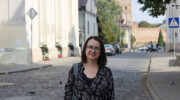Peace Europe
In Italy, a school teaches reconciliation over revenge
| View caption Hide caption
At a unique school in Italy, students from opposing sides of wars and conflicts live and study together for two years, learning to see their partner’s humanity behind the caricature.
Housed in a once-abandoned medieval citadel nestled among Tuscany’s lush woods and golden hills, Rondine every year hosts about two dozen students hailing from different parts of the world afflicted by conflict or trying to recover from it.
They come together to undertake a two-year study and cohabitation program with a person whom history and politics have labeled as their “enemy,” and learn how to deconstruct the reasons behind their hatred and conflict. Then they return to their countries of origin as peace leaders.
Born to Serb parents in the aftermath of the Balkans war, when an ethnic conflict between Orthodox Serbs and Bosnian Muslims (also known as Bosniaks) killed more than 100,000 people, Mr. Mirkovic will share a room and classes with a Bosnian Muslim for the next two years. When he returns home, Mr. Mirkovic plans to work on interfaith projects aimed at bringing Bosnia’s three main ethnic groups closer.
Since Rondine’s Citadel of Peace opened its gates in 1997, more than 1,000 students have graduated from this unique program. It’s here that Cheryl and Noa, from Lebanon and Israel respectively, have learned to share a hummus dish without fighting over its origins. It’s where Gorana, a Bosnian Catholic; Teodora, a Bosnian Orthodox; and Ana, a Bosnian Muslim, learned to forgive their parents’ narratives during their upbringing. And it’s where Oleksa and Vania, from Ukraine and Russia, are learning to watch the news together, without hurling insults at each other.
“We didn’t want to build a Utopian place where students could pretend war doesn’t exist,” explains Franco Vaccari, co-founder and president of Rondine. “We wanted, rather, to create a neutral ground, away from the chaos of their homelands and bigger Western cities, where our students could focus on a peaceful dialogue.”
Learning to see each other
The complex’s ancient gray stone buildings today host several classrooms, prayer rooms, a canteen, and sports facilities. Students occupy dormitories with double rooms to facilitate a sense of communal life, where people from two opposite sides of a conflict are encouraged to live together, see each other, and eventually forgive each other.
Upon arrival at Rondine, they are enrolled in an intensive Italian-language program. Then they focus on two main classes taught by expert peace-building trainers: methodological and leadership skills to deconstruct the idea of “the enemy,” and reconciliation.
View caption Hide caption
For that, teachers use what they call the Rondine method.
“It is a scientific method we developed to help students see conflict as an opportunity for growth,” explains Valentina Pierucci, who has been responsible for educational planning at Rondine for the past five years.
“Before transforming the conflict with the ‘enemy,’ we first help them solve the conflict within themselves,” she explains. “We help them become aware that conflict cannot be erased from everyday life, so we switch perspective and show them how to peacefully live in conflict. After all, conflict is simply a part of human relationships.”
The makeup of the student body depends on the state of current affairs when the students apply. Next year’s intake will include U.S. and Canadian students ready to engage in a dialogue with their Indigenous counterparts.
This year, new students come from Armenia and Azerbaijan, Ukraine and Russia, and Colombia and Venezuela. Historic conflict areas, such as Israel and the Palestinian territories, are almost always represented.
Living together in war time
This year, the Israeli and Palestinian students have been under intense pressure since a surprise attack on Israel by radical Islamist militants from Gaza on Oct. 7 prompted Israel to declare war and launch a ferocious aerial bombardment of the Gaza Strip.
Two months ago, Hely, a second-year student from a town near Tel Aviv, had said she felt ready to embark on her last year at Rondine. Recently returned from Jewish new year celebrations with her family, she had been welcomed back by her Palestinian roommate, 29-year-old Malak, with a “Shana Tova!” and a hug.
Rondine “has been a big opportunity to meet people from the other side of the conflict I wouldn’t have otherwise had a chance to meet,” Hely said in an interview conducted before the war began. “The first year was a chance to ask myself a lot of questions I didn’t even know I had, and to rebuild myself at age 28, which I never thought was possible.”
View caption Hide caption
Malak, also talking before the war, explained that Rondine had given her the chance to begin two different journeys, an individual one and a collective one, helped by peers coming from different areas with similar social frictions.
“For me, it was a surprise learning how much Hely and me are alike, from our lifestyle to the relationship we have with our families. I didn’t expect to relate to my ‘enemy’ so much, and that’s something I wouldn’t have noticed if I hadn’t come here,” Malak said.
Swallows playing the role of doves
Neither Malak nor Hely wanted to speak publicly after the outbreak of war, but their experience will severely test one of the Rondine method’s founding principles – that seeing one’s counterpart living everyday life helps people in conflict situations to humanize the “other,” and bridge divides.
Their journey will not end with graduation. Each new graduate is required to undertake a one-year peace-building project in his or her homeland. That part of the experience was his main goal when he opened Rondine, explains Mr. Vaccari.
“We chose the name ‘Rondine’ [which in Italian means ‘swallow’] so that they would take with them the experiences learned in Italy when they flew back to where they had migrated from,” he says.
Ruzica Markovic, a Bosnian Croat who was born a few months after the Bosnian war cease-fire, graduated from Rondine last July. Back in her native Bosnia-Herzegovina, she is engaging in interfaith activities through intercultural cafes, summer camps, and conferences to give young people more self-confidence and foster a more cohesive future for her country.
“At Rondine, I learned that if someone asks me for a glass of water, I don’t ask why; I don’t ask who it is; I just give it to them,” Ms. Markovic explains in a video call from Sarajevo. “I learned to see the other person as myself: a being with emotions, challenges, pain, frustrations, maybe some traumas. That’s the lesson I brought back home.”
Ms. Pierucci, the educational planner, insists that the school exists to train not conflict analysts and experts, but rather agents of positive change in areas where they are most needed. “Sometimes, when the [TV] news comes on and they watch together in the common living room, for a brief moment they become enemies,” she acknowledges.
“But,” she adds, “the many opportunities at the school – shared classes, social events, or even a simple soccer match – make them realize the human being behind the nationality again.”




